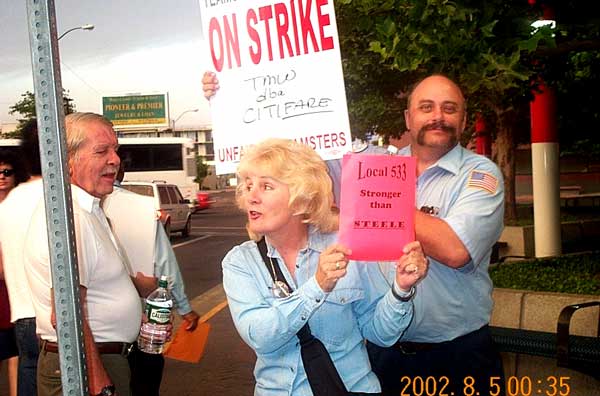
 |
|
NEWSFLASHES TEAMSTERS
2008 No
bus strike this year — Teamsters ratify new contract Reno-Sparks
Citifare employees to vote on new offer Teamsters
in contract talks with Reno muni bus managers |
|
 |
|
"Mike Steele should have come to the commission and said we are at an impasse — What would you like to do, stay at impasse or give me more money to bargain with?" — RTC Commissioner Dave Aiazzi |
Foreign-owned
management surprises riders with early fare increase
1-26-2003
NevadaLabor.com EXCLUSIVE — Police threaten to shoot
Tentative
agreement reached 12-18-2002
[Editor's Note: The contract was ratified.]
Lockout
ended, Fight for Fairness continues
8-23-2002
(August 16, 2002) — The Regional Transportation Commission of Washoe County (RTC) is comprised of five elected officials: Sparks city councilman John Mayer, Reno city councilmen Dave RIgdon and Dave Aiazzi, and Washoe County Commissioners Jim Shaw (RTC chairman) and Ted Short. Please e-mail them and ask them to intervene on behalf of the locked out workers, their families and their passengers.
Waging War — Negotiations break down, lockout continues
RENO (Aug. 16, 2002)
-- The Reno-Sparks transit system will continue to lock out its drivers, dispatchers
and support workers for another week. All-day negotiations before a federal
mediator broke off late Friday afternoon.
"I am very disappointed, we should have had a deal today. I seriously thought
we could reach agreement,"said Teamsters Local 533 CEO Lou Martino,
who accused transit manager Mike Steele of stalling.
|
|
"He's playing with
the numbers and stalling by making information requests about medical insurance
when we had a representative here a couple of weeks ago when those questions
could have been asked, but they were not," Martino asserted.
The union brought forward
a health care proposal which could save $80,000 in the first year, a step which
could provide a key to settling the dispute.
"Other dollars could be saved using the budget they've got for the first
year by reducing the number of hours budgeted for the full time drivers to work,
the number of hours for the extra board operators and the part-time employees,"
Martino said.
"Other dollars could be saved using the budget they've got for the first
year," Martino added. Negotiations are scheduled to resume on August 23,
the same day the Regional Transportation
Commission of Washoe County has scheduled a regular meeting of the five
elected officials comprising its board.
"The Regional Transportation Commission contractually retains great power
over Transit Management of Washoe despite the hands-off public posture of four
of its five elected members," Martino said.
Commissioner Dave Aiazzi, a Reno city councilman, has lobbied his colleagues
to call a special meeting about the lockout, but has received no support from
other board members.
"Mike Steele should have come to the commission and said we are at an
impasse — What would you like to do, stay at impasse or give me more money
to bargain with," Aiazzi said.
Martino today reiterated his offer to bring the workers back by extending the
previous contract. A federal mediator ruled in June that the contract expired
June 11. Management earlier insisted that the old contract remain in effect
until next year. The union has filed federal charges of illegal, unfair labor
practices over the company's attempt to extend the contract without negotiation.
The expired contract contains a no-strike/no-lockout clause. Steele wanted the
contract extended six months, Martino offered one month.
Management has offered a two percent annual pay increase, below the rate of
inflation.
"During the first seven months of 2002, the CPI-U (consumer price index for
urban areas) rose at a 2.5 percent seasonally adjusted annual rate," according
to the U.S. Dept. of Labor, Bureau of Labor Statistics website. If that rate
were to hold for the term of a three-year contract, inflation would spike at
7.5 percent. Put another way, one dollar today would be worth 92.5 cents in
2005.
RTC/TMW's offer of a two percent per year raise, or six percent over three years,
means a real-dollar pay cut of 1.5 percent over three years.
Citifare treats bus drivers as 2nd-class workers
 |
|
STRIKE AVOIDED (6-20-99) — Teamsters Local 533 CEO Lou Martino, on a live KOLO TV-8 newscast, announces that there will be no Sparks-Reno RTC/Citifare bus strike. Reporter Beryl Chong interviewed Martino immediately after the vote at the union offices on Vassar Street in Reno. A Teamsters Citifare driver, on his normal route, just happened to pass by during the live telecast. He honked hello. |
"RTC employees have a generous wage and benefit package. Ours is not in the same playing field," locked-out RTC/Citifare driver David B. Bayerl wrote in a letter published in the 8-16-2002 Reno Gazette-Journal.
The glaring disparity between the two classes of workers is the source of longrunning discontent which resulted this year in the first strike in the Sparks-Reno bus system's history.
In 1999, Transit Management of Washoe
County, the British-owned subcontractor which manages the Sparks-Reno bus system,
forced the workers to take a pay cut for the following three years.
During 1999 negotiations, the union reduced its wage demands to seven percent
in the first year and three percent in both the second and third years to keep
pace with inflation. TMW offered one percent per year and upped it to only two
percent per year for three years, where it has stood since.
This constituted a pay cut. Inflation as measured by the Consumer Price Index
totaled 2.3 percent from May '98 through April '99, according to the U.S. Bureau
of Labor Statistics.
"During the first four months of 1999, the CPI-U (Consumer Price Index
for Urban Consumers) rose at a 3.3-percent seasonally adjusted annual rate,"
Teamsters Local 533 CEO Lou Martino said at the time.
"The company should not expect its workers to sacrifice when it will not,"
Martino said.
"The TMW contract with the Regional Transportation Commission of Washoe County calls for a four percent increase in its management fee every year from 1998 to 2003," he stated.
TMW takes care of itself
The company's monthly
management fee increased to $24,020 on July 1, 1999, and to $27,019 on July
1, 2002. The contract expires next year. For that sum, TMW provides three executives
to manage the transit system. Each is eligible for annual bonuses at the discretion
of the elected RTC board. Local 533 has requested information on any such bonuses
paid in recent years.
Martino yesterday reduced the
union's current demand from five percent to four percent per year, while TMW
has not budged from another
series of below-inflation two percent increases. Contract negotiations began
again today at John Ascuaga's Nugget in Sparks.
"Our 1996 contract kept our workers up with inflation and little more.
We basically worked for 1996 wages through 1999. TMW's so-called 'last-best
offer' of another two percent per year means that when a new contract expires
in 2005, paychecks will have remained stuck somewhere in the 1990s" Martino
said.
RTC
pays its workers far more than subcontractor TMW pays bus drivers
"The commission budgeted a three percent raise for our workers in 1999
but TMW would not move from two percent. However, RTC increased the pay ranges
for its own staff as much as 47.78 percent from 1998 to 1999," Martino
said.
In 1999, RTC raised the top pay of telephone receptionists and couriers from
$29,348.80 to $37,599.72 per year, a 28.11 percent increase over 1998. The finance
manager's position rose 22.78 percent. (A complete list of 1998-2002 RTC salary
increase line items, provided by RTC, is available
by fax upon request.)
Telephone receptionist and courier pay today ranges from $29,078.40 to $41,225.60.
That top rate has increased 8.8 percent since 1999, roughly equal to inflation.
At two percent per year, bus drivers, dispatchers and support staff cannot say
the same.
In 1999, Martino said "the company's take-it-or-leave-it stonewalling leads
to only one conclusion, that they want to replace everyone with lower-paid,
inexperienced workers."
Out-of-town replacement workers have provided a skeleton crew for the degraded
bus system since the strike began on Aug. 4. Importing about 40 strikebreakers
for the non-strike of 1999 cost the taxpayers more than $136,083, according
to numbers provided by RTC.
The
system cracks up
The replacement
drivers have been involved in several accidents. On Aug. 8, they crashed the
system's new jointed bus at Citicenter, the downtown Reno transfer station.
Another unreported accident
happened at Citicenter on Aug. 14. A replacement driver, making a left onto
Fourth Street, hit a west bound car, driven by a pregnant woman. Citifare supervisors
were immediately on scene and told Reno Police that media attention
was arriving shortly and that RTC needed to remove the vehicles.
KOLO TV-8 reporters arrived a little too late, but locked out Teamsters photographed
the accident.
|
NEWSFLASH
— Replacement drivers crash new bus in Reno Las
Vegas bus hits, nearly kills woman |
On Thursday, Aug. 23, a Citifare bus was involved in a head-on collision with a vehicle at Locust and Stewart streets in Reno. At least one of the auto's passengers was transported to a hospital. Union members shot videotape at the scene.The Reno Police Department did not return calls for additional information.
Teamsters Union Local 533 Business Representative Mark Tracy said "We have documented and continue to substantiate numerous incidents of unsafe operation."
Transit Management of
Washoe, Inc., is a subsidiary of Cincinnati-based First Transit, which is owned
by FirstGroup of Great Britain.
Teamsters Local 533 represents about 2,100 workers in a variety of businesses
and government agencies throughout the region.
Watch this page for breaking news.
How we got to strikeout 2002
|
Site composed
& maintained by Deciding Factors
Comments and suggestions appreciated